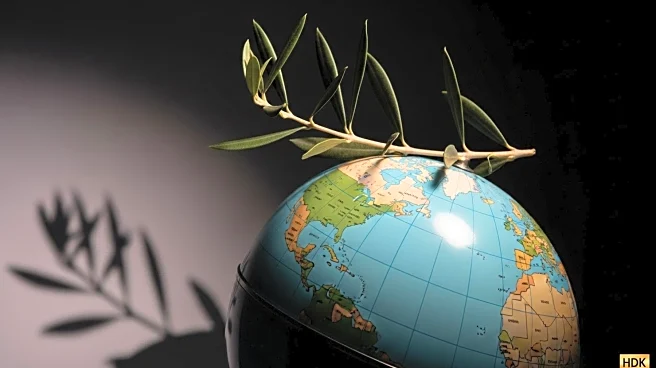What's Happening?
France has officially recognized the state of Palestine, joining a growing number of countries advocating for a two-state solution to the Israeli-Palestinian conflict. President Emmanuel Macron announced the decision at the United Nations, emphasizing the need for peace and condemning the ongoing war in Gaza. This move comes amid heightened international pressure on Israel regarding the humanitarian crisis in Gaza and settlement activities in the West Bank. The recognition has sparked debates on the future leadership of Palestine and the role of Hamas, with Palestinian President Mahmoud Abbas calling for a unified state without weapons.
Why It's Important?
France's recognition of Palestine marks a significant shift in international diplomacy, potentially influencing other nations to follow suit. This decision could impact the geopolitical landscape in the Middle East, as it challenges Israel's stance and increases pressure for a resolution to the conflict. The recognition may also affect US foreign policy, as President Trump is set to address the UN General Assembly amidst these developments. The move underscores the urgency for a peaceful solution and highlights the international community's role in facilitating dialogue between Israel and Palestine.
What's Next?
The recognition of Palestine by France and other countries may lead to increased diplomatic efforts to achieve a two-state solution. The EU plans to establish a financial instrument for Gaza's reconstruction, indicating a commitment to supporting Palestinian development. However, the path forward remains complex, with challenges in governance and security, particularly regarding Hamas's role. The international community will need to navigate these issues to ensure a sustainable peace process, while addressing humanitarian concerns in Gaza.
Beyond the Headlines
The recognition of Palestine raises questions about the future governance structure and the role of Hamas in Palestinian politics. The move also highlights the broader implications for regional stability, as countries like Saudi Arabia advocate for a two-state solution. Additionally, the decision reflects a shift in global attitudes towards the Israeli-Palestinian conflict, emphasizing the need for a balanced approach that considers both security and humanitarian aspects.










